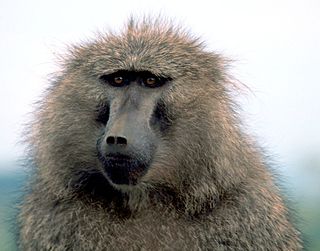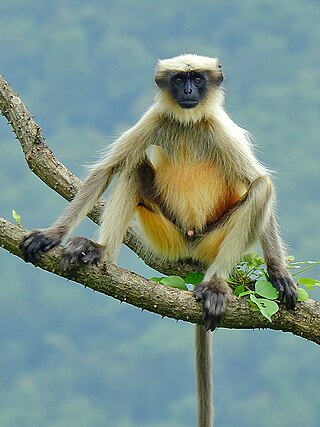
Edward Osborne WilsonForMemRS was an American biologist, naturalist, ecologist, and entomologist known for developing the field of sociobiology.
Sociobiology is a field of biology that aims to examine and explain social behavior in terms of evolution. It draws from disciplines including psychology, ethology, anthropology, evolution, zoology, archaeology, and population genetics. Within the study of human societies, sociobiology is closely allied to evolutionary anthropology, human behavioral ecology, evolutionary psychology, and sociology.

Robert Mearns Yerkes was an American psychologist, ethologist, eugenicist and primatologist best known for his work in intelligence testing and in the field of comparative psychology.

Primatology is the scientific study of primates. It is a diverse discipline at the boundary between mammalogy and anthropology, and researchers can be found in academic departments of anatomy, anthropology, biology, medicine, psychology, veterinary sciences and zoology, as well as in animal sanctuaries, biomedical research facilities, museums and zoos. Primatologists study both living and extinct primates in their natural habitats and in laboratories by conducting field studies and experiments in order to understand aspects of their evolution and behavior.

The woolly lemurs, also known as avahis or woolly indris, are nine species of strepsirrhine primates in the genus Avahi. Like all other lemurs, they live only on the island of Madagascar.

Semnopithecus is a genus of Old World monkeys native to the Indian subcontinent, with all species with the exception of two being commonly known as gray langurs. Traditionally only one species Semnopithecus entellus was recognized, but since about 2001, additional species have been recognized. The taxonomy has been in flux, but currently eight species are recognized.

Robin Ian MacDonald Dunbar is a British biological anthropologist, evolutionary psychologist, and specialist in primate behaviour. Dunbar is professor emeritus of evolutionary psychology of the Social and Evolutionary Neuroscience Research Group in the Department of Experimental Psychology at the University of Oxford. He is best known for formulating Dunbar's number, a measurement of the "cognitive limit to the number of individuals with whom any one person can maintain stable relationships".
Steven Peter Russell Rose is an English neuroscientist, author, and social commentator. He is an emeritus professor of biology and neurobiology at the Open University and Gresham College, London.

Sociobiology: The New Synthesis is a book by the biologist E. O. Wilson. It helped start the sociobiology debate, one of the great scientific controversies in biology of the 20th century and part of the wider debate about evolutionary psychology and the modern synthesis of evolutionary biology. Wilson popularized the term "sociobiology" as an attempt to explain the evolutionary mechanics behind social behaviour such as altruism, aggression, and the nurturing of the young. It formed a position within the long-running nature versus nurture debate. The fundamental principle guiding sociobiology is that an organism's evolutionary success is measured by the extent to which its genes are represented in the next generation.

Not in Our Genes: Biology, Ideology and Human Nature is a 1984 book by the evolutionary geneticist Richard Lewontin, the neurobiologist Steven Rose, and the psychologist Leon Kamin, in which the authors criticize sociobiology and genetic determinism and advocate a socialist society. Its themes include the relationship between biology and society, the nature versus nurture debate, and the intersection of science and ideology.

David Sloan Wilson is an American evolutionary biologist and a Distinguished Professor Emeritus of Biological Sciences and Anthropology at Binghamton University. He is a son of author Sloan Wilson, and co-founder of the Evolution Institute, and co-founder of the spinoff nonprofit Prosocial World.
Donald Symons is an American anthropologist best known as one of the founders of evolutionary psychology, and for pioneering the study of human sexuality from an evolutionary perspective. He is one of the most cited researchers in contemporary sex research. His work is referenced by scientists investigating an extremely diverse range of sexual phenomena. Harvard psychologist Steven Pinker describes Symons' The Evolution of Human Sexuality (1979) as a "groundbreaking book" and "a landmark in its synthesis of evolutionary biology, anthropology, physiology, psychology, fiction, and cultural analysis, written with a combination of rigor and wit. It was a model for all subsequent books that apply evolution to human affairs, particularly mine." Symons is Professor Emeritus in the Department of Anthropology at the University of California, Santa Barbara. His most recent work, with Catherine Salmon, is Warrior Lovers, an evolutionary analysis of slash fiction.
Lionel Tiger is a Canadian-American anthropologist. He is the Charles Darwin Professor of Anthropology at Rutgers University and co-Research Director of the Harry Frank Guggenheim Foundation.
The Sociobiology Study Group was an academic organization formed to specifically counter sociobiological explanations of human behavior, particularly those expounded by the Harvard entomologist E. O. Wilson in Sociobiology: The New Synthesis (1975). The group formed in Boston, Massachusetts and consisted of both professors and students, predominantly left-wing and Marxist.

Josep Call is a Spanish comparative psychologist specializing in primate cognition.
The history of evolutionary psychology began with Charles Darwin, who said that humans have social instincts that evolved by natural selection. Darwin's work inspired later psychologists such as William James and Sigmund Freud but for most of the 20th century psychologists focused more on behaviorism and proximate explanations for human behavior. E. O. Wilson's landmark 1975 book, Sociobiology, synthesized recent theoretical advances in evolutionary theory to explain social behavior in animals, including humans. Jerome Barkow, Leda Cosmides and John Tooby popularized the term "evolutionary psychology" in their 1992 book The Adapted Mind: Evolutionary Psychology and The Generation of Culture. Like sociobiology before it, evolutionary psychology has been embroiled in controversy, but evolutionary psychologists see their field as gaining increased acceptance overall.

This bibliography of biology is a list of notable works, organized by subdiscipline, on the subject of biology.

Wolfgang Peter Johann Dittus is a primatologist and behavioral ecologist based in Sri Lanka.

The Evolution of Human Sexuality is a 1979 book about human sexuality by the anthropologist Donald Symons, in which the author discusses topics such as human sexual anatomy, ovulation, orgasm, homosexuality, sexual promiscuity, and rape, attempting to show how evolutionary concepts can be applied to humans. Symons argues that the female orgasm is not an adaptive trait and that women have the capacity for it only because orgasm is adaptive for men, and that differences between the sexual behavior of male and female homosexuals help to show underlying differences between male and female sexuality. In his view, homosexual men tend to be sexually promiscuous because of the tendency of men in general to desire sex with a large number of partners, a tendency that in heterosexual men is usually restrained by women's typical lack of interest in promiscuous sex. Symons also argues that rape can be explained in evolutionary terms and feminist claims that it is not sexually motivated are incorrect.
Colin A. Chapman is a professor at the Vancouver Island University in British Columbia, Canada. In addition, he is a Fellow of the Royal Society of Canada, an Honorary Lecturer at Makerere University in Uganda, a Member of the Committee of Research and Exploration at National Geographic, and an Associate Scientists of the Wildlife Conservation Society in New York. Prior to taking on his position at McGill University, he was at the University of Florida in the Department of Zoology from 1993 to 2004. He is internationally recognized for his 30+ years of research into primate ecology, population regulation, nutrition, and disease dynamics and for his contribution to conservation globally.